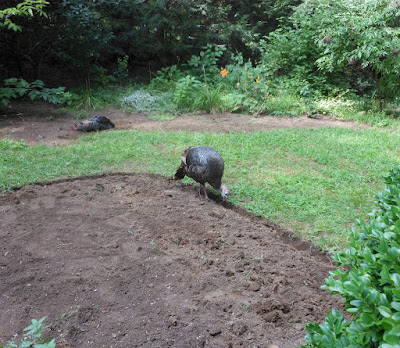 This project only took an afternoon (the turkeys helped)
This project only took an afternoon (the turkeys helped)
After years of vowing that I would someday reduce the size of my lawn, I finally took the plunge. As I explained in my post on August 21st, starting small was key, but once I got started I couldn't stop. Maybe the espresso coffee I had added to my enthusiasm. In any event, after removing the sod I again added peat and edged the second bed. I'll be planting a sedum cultivar that spreads quickly and forms a very attractive groundcover in part of this bed. More on that and my plans to add clover to the existing lawn in a future post.
This is a work in progress and I'm planning to refine the border on the left, but overall, I'm pleased. It was easier than I thought and I like the new design.
For a long time I justified maintaining a large lawn because I leave most of my acre wild. But now, I can still enjoy some lawn and do even more to help wildlife by making room for additional native plants that provide food, cover and nesting materials. I can even imagine putting in a small pond.
Obviously, I think downsizing your lawn is an all around good thing. But if you still need convincing, note the following benefits:
●Save time ― less mowing and mowing less often
●Save money ― on water and fertilizer
●Expand your “birdscape” ― birds love worms and worms abound in these garden beds
●Drought proof your garden ― most native plants do well with less watering
●Gain space for more native plants
●Last but by no means least ― reduce your carbon footprint!
This is a work in progress and I'm planning to refine the border on the left, but overall, I'm pleased. It was easier than I thought and I like the new design.
For a long time I justified maintaining a large lawn because I leave most of my acre wild. But now, I can still enjoy some lawn and do even more to help wildlife by making room for additional native plants that provide food, cover and nesting materials. I can even imagine putting in a small pond.
Obviously, I think downsizing your lawn is an all around good thing. But if you still need convincing, note the following benefits:
●Save time ― less mowing and mowing less often
●Save money ― on water and fertilizer
●Expand your “birdscape” ― birds love worms and worms abound in these garden beds
●Drought proof your garden ― most native plants do well with less watering
●Gain space for more native plants
●Last but by no means least ― reduce your carbon footprint!


No comments:
Post a Comment